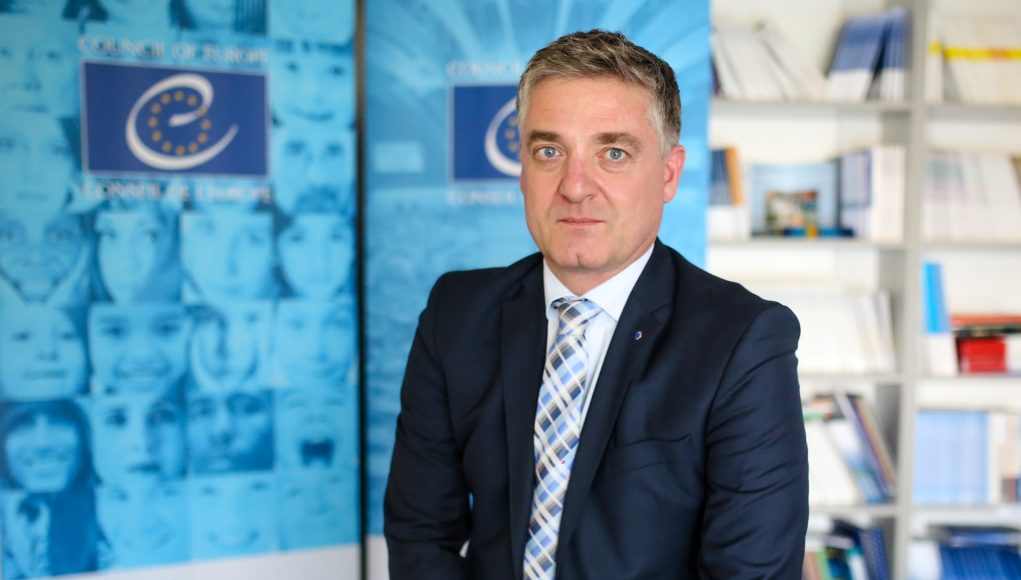Our human rights training programme, the HELP, traditionally meant for lawyers and legal professionals, is now accessible for everyone
We have interviewed the officials from diplomatic community to find out how embassies have organized their diplomatic activities during the state of emergency, as well as, how they spend their free time and what they will do first when the state of emergency is abolished. We talked to Tobias Flesenkemper, Head of the Council of Europe office in Belgrade: “Our support for human rights is unwavering, during the crisis and beyond“ he stressed.

How did you organize the Council of Europe’s activities in Serbia?
My first concern was to find a way to keep our team in Belgrade safe and to protect the health of everyone, having in mind that the Council of Europe’s Office in Belgrade must continue to pursue its mission to the benefit of all people in Serbia. Therefore, the current situation calls for adjusting our working methods. Our team started to work from home, most of the public events have been put on halt, but some of them are taking place through electronic communication means. We remain committed to support Serbia in addressing the current challenges, in full respect of the principles of human rights, democracy and the rule of law. I am particularly grateful that we were able to focus our work on vulnerable groups. For instance, the ROMACTED programme of the Council of Europe and the EU has been empowering Roma as citizens, including through the establishment at local level a network of community workers who are now an integral part of the crisis mobilisation.
Can you share with us some concrete actions?
The Council of Europe monitoring bodies continue providing recommendations to member states. For example, the Council of Europe’s anti-corruption group GRECO issued guidelines last week to its 50 member States, including Serbia, on mitigating new corruption risks during the COVID19 emergency. Our Platform to promote the protection of journalism and safety of journalists continues to operate and to inform the public concerning cases of intimidation of journalists. Our human rights training programme, the HELP, traditionally meant for lawyers and legal professionals, is now accessible for everyone. You can learn about many aspects of human rights online and the courses are for free, many of them are also available in Serbian. You can learn, for instance, about the worrying problem of domestic and gender-based violence and how to prevent and fight it, in this respect I would like to draw the attention to the recent declaration of the Committee of the Parties to the Istanbul Convention which Serbia has also ratified. The pandemic does not put crime at rest, we need to be vigilant and address the vulnerabilities in our systems and protect public health from falsified medical products: the Council of Europe’s MEDICRIME Convention created to counter production and distribution of fake drugs is there to help authorities of European states. On a general level the Council of Europe issued guidance in early April to governments on respecting human rights, democracy and the rule of law during the COVID-19 crisis. This document is available in Serbian on our office’s website.
How do you spend your private time during the pandemic?
Private and work time are actually more difficult to separate with our teleworking arrangements. We are holding teleconferences in our homes and at the same time we have to adapt our schedules to the restrictions in place. The restrictions often lead to a new working day organisation, spreading into the evening. At the same time, it is important to unwind. Most of our team took a long Easter break. I was happy to catch up on reading with Saša Stanišić book “Origins” (Herkunft) that won the German Book Prize 2019. I am also reading books on the history and culture of Europe. It is inspiring to see how European institutions were created and developed against challenges which more formidable than this crisis. An inspiration has been the works of the Dutch Johan Huizinga, one the founders of modern cultural history.
What will you do first after the state of emergency is abolished?
The restrictions, as justified as they can be, are reducing our freedoms in an unprecedented manner, also on an everyday basis. I am looking forward to simply walking around through the city and to being able to travel and visit friends and family across Europe. As for our freedom of assembly, I am missing concerts and theatre and I will certainly be attending performances at Kolarac as soon as it possible. I will also feel privileged to reunite with my counterparts from the Belgrade diplomatic community: unfortunately, we will not be able to have a public event to mark the Europe Day on 9 May, but for Human Rights Day on 10 December we shall hopefully be all together again together. This day is especially important for us at the Council of Europe, as we are celebrating 70 years of the European Convention on Human Rights, the key document of our organisation, this year.
Facebook: @CouncilofEuropeBelgrade